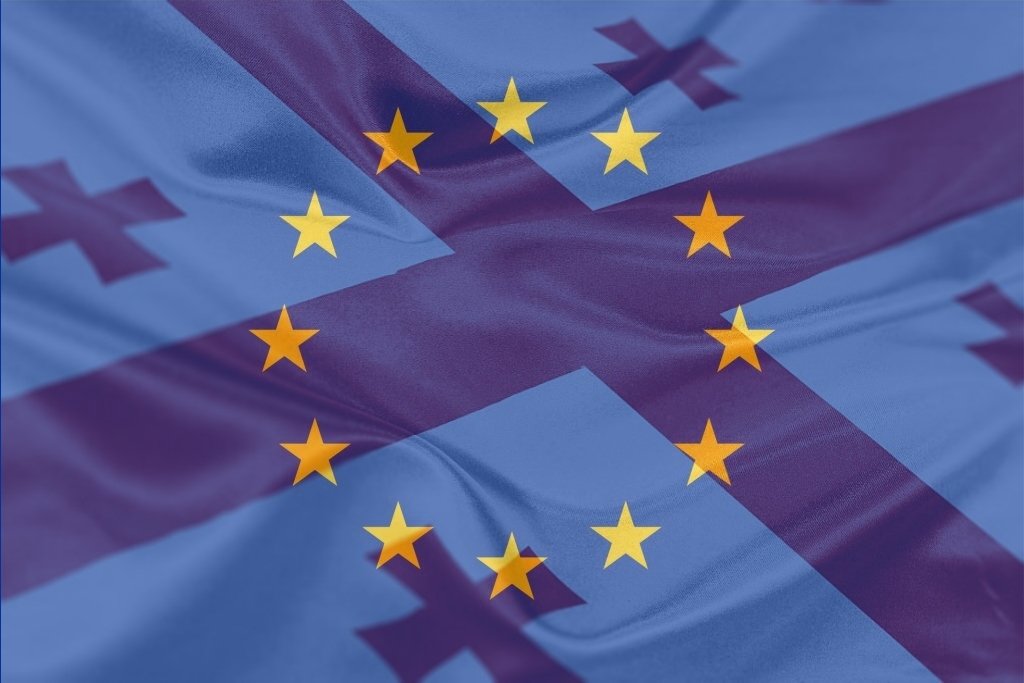European Central: Georgia Not Granted Eu Candidate Status
Yevhen Borysov/Mariano Sayno
Ukraine and Moldova enthusiastically received the news that they became candidate countries for the European Union. Georgia however will have to continue to wait. Instead of receiving candidate status, the Eu recognized the nation's European perspective. The EU determined that Georgia is not yet ready for candidacy status like the other two nations. Ukraine, Moldova, and Georgia all received lists of reforms they need to accomplish. The list Georgia received is noticeably longer. 60,000 Georgians protested in Tbilisi in response to the decision. It is estimated that 83 percent of Georgians support joining the European Union. While this may not be the response that Georgia wanted it means the national government needs to work harder if it genuinely wants to achieve membership status.
In order to gain candidate country status, Georgia will have to bring stability to its political system. Two opposition parties claimed parliamentary elections were rigged and refused to concede which caused a political crisis. Georgian Dream, the party that won worked on building a coalition government, but the two opposition parties refused to sit in government. European Council President Charles Michel successfully helped mediate an accord between the political parties. Not only did it permit Georgia’s parliament to work but it also outlined electoral and judicial reforms. Charles Michel already planned visits to several nations in the EU’s eastern neighborhood including the visit to Georgia. This allowed him to take advantage of the visit to broker a deal between the political parties. As the political crisis was solved, it shows that Georgia is willing to move forward. With additional work, it will be possible to achieve EU membership in the long run.
There are also concerns about Oligarchs still exerting too much control in the country. Bidzina Ivanishvili, a former Prime Minister of Georgia and billionaire still effectively is in control of Georgian Dream which allows him to keep his hand in the country's economy. In January of 2021, Ivanishvili declared he was quitting politics and stepping down as the chair of Georgian Dream but the political opposition is skeptical. This is because after 13 months of being Prime Minister of the country he stepped down quitting because he claimed he reached his goal. There are concerns that he has been wielding power behind the scenes. As long as Ivanishvili maintains control formally or behind the curtain it will be difficult for the nation to show it is a democracy in order to become a candidate country and eventually a member of the EU.
The European Commission also notes that the country needs to work toward reducing violence against women and achieving gender equality, work towards media freedom, protect human rights, adopt reforms to ensure an independent judiciary, and allow state institutions to function. These requests will be difficult to accomplish yet can help people understand why Georgia was not yet granted EU candidacy status. The European Commission will continue to observe Georgia’s progress toward these reforms and these reforms will report an update on the nation’s progress at the end of this year.
Earlier in June before the decision came out Georgian Dream was already upset with the European Parliament. MP Dimitri Khundadze was bold and said that Georgia should reject EU candidate status if it was similar to the resolution. Unfortunately for him, Georgia was rejected and had no choice in the matter. This mentality also shows that some Georgia politicians are not prepared to join the European Union. It is one thing to have dialogue and debates over topics, but member states need to be open to criticism. No member state is perfect in the European Union and feedback from the bloc is one way nations can realize their weak points that they must work on. The EU already has two member states giving it trouble and is unlikely to allow another nation to become part of the bloc if there is any hesitancy about how the country will conduct itself.
Khundaze also stated “Neither Bidzina Ivanishvili nor the Georgian state can be intimidated by threats of sanctions. It has become clearer that EU membership is not just a prospect for Georgia's future, it is also a prospect for Europe itself,”.
While it is true that the EU will also benefit from Georgian membership, it is a two-way street and the EU is willing to wait until nations are ready to progress in the process of joining the bloc. The European Union has made it clear that Ukraine will not be accepted immediately into the European Union as a result of Russia’s invasion. Instead, like other nations that became member states, Ukraine will have to prove it accomplishes reforms requested by the bloc before its accession will take place. The same is true for Moldova which was also granted EU candidate status. Now Georgia has to prove that it is ready for candidate status instead of simply being in possession of the European perspective. The required reforms will be beneficial for Georgian citizens and are not just simply part of the paperwork to become an EU member state.

